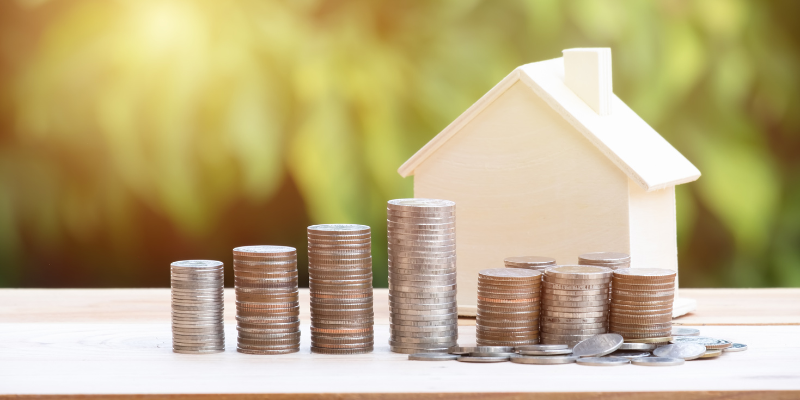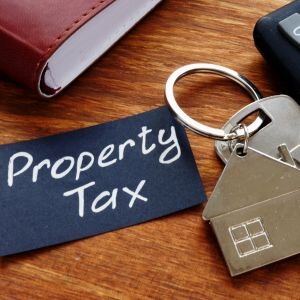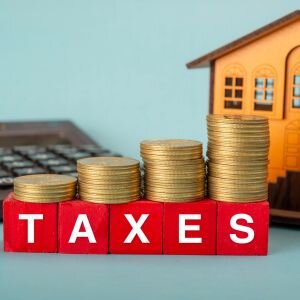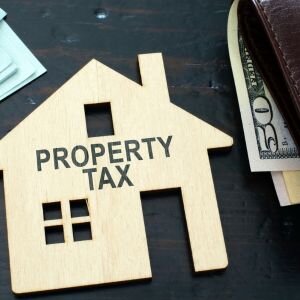
Understanding Washington State Property Tax Rates
Taxes on real estate are an important part of the budget for both landlords and real estate investors in Washington State. The property’s estimated value, which is set by the county assessor’s office, is used to figure out these taxes.
Property tax dollars fund essential services like public schools, road maintenance, and emergency response systems. Washington uses a budget-based system, so rates can differ widely from one area to another depending on what each county or city needs to raise in revenue.
For example, because of different budget needs, homeowners in King County may have to pay more in property taxes than homeowners in Spokane County. That’s why you should pay close attention to changes in local taxes when making long-term plans or choosing a place to live.
Additionally, Washington limits the annual growth in property tax income from existing properties to 1%. Although home prices may go up, this helps keep homeowners’ bills from going up by a lot. To lower your tax bill and change how you spend your money overall, it’s also a good idea to learn about exemptions and relief programs, especially those for seniors and veterans.
Key Factors Influencing Property Tax Assessments in Washington
You should know what determines your Washington property tax estimate if you plan to buy or own a home there. According to market trends and recent sales in the area, the county assessor figures out how much your house or investment is worth. This is one of the most important factors.
Where the property is located also matters a lot. Each county and city sets its own levy rates, so identical homes can be taxed very differently depending on the neighborhood. Plus, any changes you make to your home, like a remodel or addition, can bump up your assessed value and, with it, your tax bill.
There are also programs in place to help offset some of these taxes. For example, seniors and disabled veterans may qualify for significant reductions, depending on their income. On a bigger scale, local budget decisions and economic conditions can cause tax rates to shift from year to year. That’s why staying informed is crucial both for budgeting as a homeowner and forecasting returns as an investor. If you have any questions, Serious Cash Offer can help.
The Role of County Assessors in Determining Property Tax Values Across Washington
County assessors in Washington are the people behind your property’s tax value. Their job is to estimate your property’s fair market value through regular assessments, and that value directly impacts your tax bill.
To do this, assessors look at things like your property’s location, size, condition, and any updates you’ve made. They also compare it to recent sales of similar properties in your area to make sure the valuation reflects current market conditions.
These assessments are more than just paperwork; they determine how local tax burdens are shared across homeowners and investors. The money collected goes toward services like public education, emergency response, and road upkeep.
Assessors follow state rules and use modern tools and appraisal methods to ensure that everyone is treated fairly. As market conditions shift, these officials update property values to stay in line with what’s happening in neighborhoods throughout the state.
Understanding the Relationship Between Real Estate Values and Taxes in Washington
Property values and property taxes go hand in hand in Washington, and understanding how they connect is essential for homeowners and investors. Your property’s assessed value, set by the local taxing district, is the main factor in how much you owe in taxes.
When real estate prices go up, assessed values usually follow, which can lead to higher taxes. But Washington puts a one percent cap on how much property tax revenue can increase each year unless voters approve special measures. So even if your home value jumps, your tax bill won’t skyrocket unless voters say otherwise.
That said, it’s still important to watch how local real estate trends and voter-approved levies play out. For investors, this can affect long-term returns. For homeowners, it can change what you owe from year to year. Being in the loop on assessments and local ballot measures helps you better manage your real estate costs.
How to Calculate Your Washington Property Tax Bill

Figuring out your property tax bill in Washington involves a few moving parts, but it’s manageable once you know what to look for. Start by checking your property’s assessed value, which is set by the county assessor based on market conditions, size, location, and improvements.
Next, look at the local levy rates. These are set by school districts, cities, fire departments, and other local entities and are applied per $1,000 of your property’s assessed value. Multiply the total levy rate by your property’s assessed value (in thousands), and you’ve got your annual tax bill.
If you want to sell your home in Washington, don’t forget to see if you qualify for exemptions, like those for seniors, veterans, or energy-efficient upgrades. These can significantly reduce your tax liability. Also, because both your property value and local tax rates can change each year, reviewing your assessment annually is a smart habit for financial planning.
The Impact of Local Levies on Washington Property Taxes
Local levies are a major piece of the property tax puzzle in Washington. These voter-approved taxes come from various taxing districts like schools, fire services, libraries, and hospital districts, and they directly influence what you pay each year.
If voters approve a new school construction bond, for example, property taxes in that district will usually go up to cover the cost. So even if your property’s assessed value stays the same, your tax bill could still increase due to new levies.
For investors, this can impact your return projections, especially if you’re holding multiple properties across different districts. For homeowners, it’s a reminder to pay attention to local ballot measures and community planning. Keeping track of levy activity can help you anticipate changes and adjust your finances accordingly.
Comparing Residential and Commercial Property Taxes in Washington
Washington handles residential and commercial property taxes a bit differently, and those differences matter depending on what kind of property you own. Residential taxes are typically based on the home’s assessed value, with local assessors updating that figure each year to reflect market trends.
Commercial properties, on the other hand, are often assessed using additional criteria, such as income potential, business use, and location-specific demand. As a result, commercial taxes can be higher and more complex to calculate.
Both types of properties are subject to local millage rates, but commercial ones may also require added municipal services, which can bump up their tax obligations. For investors, this means factoring these costs into your ROI calculations and knowing which exemptions or deductions apply to each property type.
Exploring Exemptions and Deductions for Washington Homeowners
Taking advantage of property tax exemptions and deductions can lead to meaningful savings, especially in Washington. The state offers several programs targeted at seniors, veterans, and homeowners with disabilities, allowing qualified individuals to reduce their taxable property value.
For example, the Senior Citizen and Disabled Persons Exemption program can significantly lower your tax burden if you meet certain income and age or disability requirements. These savings can make a big difference for fixed-income households.
Depending on the type of property and where it is located, real estate owners may also be able to get tax breaks for making improvements that save energy or protect historic sites. It’s important to know what’s offered in your area and to apply on time. Making sure you know about allowances ahead of time will keep you from losing money year after year.
How to Appeal Your Property Tax Assessment in Washington
If you think your property in Washington is over-assessed, you have the right to appeal—and doing so could save you a decent amount on your tax bill. Start by reviewing your annual assessment notice and comparing your home’s value to recent sales of similar properties in your area.
If your property seems overvalued, gather evidence like market comparisons, appraisals, and even photographs that show differences between your home and higher-priced comps. File your appeal with the County Board of Equalization by the deadline listed—usually within 30 to 60 days.
Having solid documentation is key. You might also consider hiring a real estate expert or attorney who specializes in property tax appeals, especially if the stakes are high. A well-prepared appeal increases your odds of success and helps ensure you’re being taxed fairly.
Effective Strategies to Lower Your Washington Property Taxes
Lowering your property tax bill in Washington isn’t just possible, it’s often a smart financial move. One of the easiest ways to start is by double-checking your assessment each year. If the assessed value doesn’t match current market conditions, you may have grounds to appeal.
Beyond that, apply for any exemptions you’re eligible for, like those offered to senior citizens, disabled individuals, or veterans. Even small deductions can add up over time. If you’ve made energy-efficient upgrades or preserved a historic feature, check if those improvements qualify for tax relief.
Investors can benefit from understanding how different types of properties are taxed and planning acquisitions or improvements with tax efficiency in mind. Staying current with property tax laws and actively managing your portfolio can lead to long-term savings.
Recent Trends in Washington State Property Tax Rates

Washington’s property tax rates have shifted in recent years, largely due to rising real estate values and changing municipal needs. In many areas—especially cities like Seattle—home prices have gone up quickly, pushing assessed values higher and, in turn, affecting tax bills.
At the same time, Washington’s 1% cap on annual property tax revenue increases has helped keep those hikes in check, unless voters approve extra levies. And many have—in support of school upgrades, public safety improvements, and other local initiatives.
It’s important for both investors and renters to understand these trends. Higher assessed values can change your budget, your hopes for returns, or the way you buy things. You can figure out where the next tax hike might be coming from by keeping an eye on voter proposals and how neighborhoods are growing.
Analyzing the Role of School Districts in Washington’s Property Tax System
School districts play a major role in shaping property tax rates across Washington, and their influence is something both homeowners and real estate investors need to pay attention to. Property taxes are a primary funding source for public schools, helping cover everything from teacher salaries to facility upgrades.
Special levies can be proposed by any school district and must be passed by voters. Tax rates can be different in neighborhoods that are close to each other but in different school districts because of these bills. This is why two homes that are very similar can have very different tax bills, just because they are in different school districts.
These disparities also affect property values. Well-funded school districts can make certain neighborhoods more attractive, raising demand and home prices. For investors, understanding which districts have active or upcoming levies can help assess the long-term value and tax implications of a property. Homeowners, meanwhile, should stay informed about how school-related tax measures may impact their annual expenses.
Breaking Down the Annual Cycle of Property Tax Collection in Washington
Understanding the annual property tax cycle in Washington helps homeowners and investors plan ahead and avoid surprises. Every year, county assessors determine your property’s assessed value, which then becomes the basis for calculating your taxes.
Tax bills are typically mailed out in February. Washington gives property owners two options: pay the entire bill by April 30, or split it into two equal payments one due April 30, the other by October 31. These due dates are firm, and missing them can result in penalties or interest charges, so staying on top of the timeline is key.
The money from these taxes goes straight to public services like fire stations, schools, infrastructure projects, and more. For homeowners, keeping track of when their bills are due helps them make better budget plans. Real estate investors can better manage their cash flow and meet their tax responsibilities across multiple properties if they understand this plan.
Navigating Changes in Legislation Affecting Washington Property Taxes
Washington’s property tax laws don’t stay static; legislation often shifts in response to budget needs, public demand, or broader economic trends. Whether you’re a homeowner or a real estate investor, it’s critical to stay informed about new laws that can affect your tax liabilities.
Recent legislative changes have touched on everything from assessment practices to exemptions. For example, lawmakers might update the income thresholds for senior citizen exemptions or revise how frequently property values are reassessed. These updates can have direct impacts on what you owe or what you’re able to deduct.
Investors especially need to monitor how these changes affect various types of properties and districts. A law that benefits residential homeowners in one county might increase tax burdens on commercial holdings in another. Consulting local tax professionals or staying engaged with trusted online sources can help you keep your strategies current and compliant. If you have any questions, you may contact our team.
The Effect of Economic Growth on Urban vs. Rural Property Taxes in Washington
Economic development in Washington doesn’t affect every area the same way, and that creates a big gap in property tax trends between urban and rural locations. In fast-growing cities like Seattle and Bellevue, property values have risen sharply in recent years. This drives up assessments, which in turn lead to higher property tax bills.
These increases are largely due to job growth, rising housing demand, and infrastructure investments. Urban homeowners and investors often pay more in property taxes, but they may also benefit from higher property appreciation.
Rural areas, on the other hand, tend to see slower value increases and more modest tax bills. While the upside in appreciation may be smaller, the overall cost of ownership, including taxes, can be much lower. For investors, this creates a trade-off between high-tax, high-reward urban properties and lower-cost, steadier rural options. Understanding the influence of regional economic trends helps guide smarter purchase decisions across the state.
Understanding Special Assessment Districts and Their Impact on Taxes

Special assessment districts are another layer of taxation that Washington property owners should know about. These districts are created to fund local improvement projects, such as sewer system upgrades, sidewalk repairs, or street lighting installations that benefit a specific neighborhood or development.
You’ll be charged an extra fee on top of your normal property tax bill if your home is in a special assessment district. These fees may depend on how big your property is, how much it’s worth, or even how close it is to the improvement job.
While these assessments can raise your costs in the short term, they often boost property values over time by improving infrastructure and neighborhood appeal. That said, buyers should always check for existing or pending special assessments before purchasing a property. Awareness of these fees helps you avoid unexpected costs and can be a deciding factor in your investment strategy.
The Influence of Government Budget Requirements on Statewide Tax Rates
Government budget needs are a big reason why Washington’s property tax rates are what they are. Every year, local and state governments have to figure out how to best spend money on things like public schools, health care, transportation, safety services, and more. Since a big part of this money comes from property taxes, when spending goes up, taxes usually go up too.
When the cost of running schools, upgrading roads, or expanding emergency services rises, local governments may raise tax rates or propose new levies to meet those demands. These shifts don’t just affect public budgets they impact your personal or investment finances, too.
If taxes go up, people who own homes might have to pay more each month for their mortgages. If running costs rise faster than rents or property values, investors may not be able to make as much money. Spending habits and how they relate to tax policies can help you guess how much things will cost and be ready for changes as they happen.
Future Predictions: What’s Next for Property Taxation Policies in Washington?
Looking ahead, Washington’s property tax policies are likely to keep evolving in response to market shifts, population growth, and legislative goals. As housing demand continues to climb, especially in urban hubs, lawmakers may look for ways to balance funding needs with housing affordability.
We might see expanded exemptions for low-income homeowners or new approaches to taxing luxury or second homes. There could also be reforms aimed at simplifying the appeals process or modernizing how properties are assessed using new technology.
As improving climate resilience becomes more important, environmental factors like places that are likely to flood or catch fire could affect taxes in the future. Homeowners and real estate buyers should stay involved: keep an eye on changes in local policies and market trends, and be ready to change your plan as needed.
What Is the Current Tax Rate in Washington?
There isn’t a single, flat property tax rate in Washington State. Instead, rates change a lot from place to place. The state’s average effective property tax rate is about 0.93%, which is a little less than the average rate across the country. If you’re looking at particular counties or cities, though, this number might not tell you what you need to know.
Take King County, for example. Home to Seattle, it has some of the highest property tax rates in the state due to voter-approved school levies, infrastructure projects, and high property values. Rural counties like Okanogan or Pend Oreille may have much lower effective rates.
Because of this, investors need to do a lot of study in the area. The taxes on a home in one zip code might be thousands more per year than those on a home just a few miles away. Also, people who own their own homes should check with the county assessor’s office to find out what their exact rate is and how it’s figured.
At What Age Do You Stop Paying Property Tax in Washington?
While there’s no official age at which Washington residents stop paying property taxes entirely, the state does offer a valuable exemption program for seniors. If you’re 61 or older or disabled, and meet the income limits, you may qualify for the Senior Citizen and Disabled Persons Exemption.
This program can freeze your property’s assessed value, reduce the taxable amount, or even exempt you from some levies entirely, depending on your income and property value. To qualify, your home must be your primary residence, and you must file an application with your local assessor.
For older people who want to stay in their homes during retirement, this exemption can make a big difference. Real estate investors who work with older people should also think about how these exemptions might change the appeal and cost of some homes.
What Is the New Property Tax Law in Washington State?
Recent changes to Washington’s property tax rules are meant to make the system more fair and clear while still funding important services. The way estimated values are updated has changed a lot. Now, assessors are expected to use more up-to-date market data, which could mean that tax bills are changed more quickly.
The law also has parts that make it easier for people to see where their tax money is going. Now, local governments have to make it clearer how property tax money is spent, like how much goes to schools, transportation, or fire districts.
For homeowners, these changes may mean more accurate assessments but also a need to stay alert to fluctuations. Investors, meanwhile, should pay attention to how assessment changes and disclosure rules might affect market conditions and investment planning. The goal of the new law is to make the system fairer but it also demands more awareness from property owners.
What City in Washington Has the Highest Tax Rate?
Seattle usually has the highest property taxes in Washington. That’s mostly because the city keeps putting money into infrastructure, schools, and housing, some of which comes from levies that voters passed.
A big part is also played by Seattle’s packed population and competitive housing market. When a property is assessed at a high value, the tax bill goes up straight. And since new levies are often on the ticket, Seattle homeowners and investors need to keep an eye on upcoming votes and how they might affect their bottom line.
If you’re considering buying in Seattle, factor property taxes into your total cost of ownership or investment returns. While the city offers strong appreciation and rental demand, the higher taxes can eat into margins more than in neighboring areas with lower rates.
Need to sell your home in Edmonds quickly and easily? Serious Cash Offer offers fair cash offers, buys houses as-is, and takes care of all the details with no commissions or headaches. Call us today at (206) 312-1920 for a free, no-obligation offer.
| TAXPAYERS | PROPERTY TAX | COUNTY EQUIVALENTS | EFFECTIVE TAX RATE | SALES TAX | INCOME TAX |
| INCOME TAXED | PERSONAL INCOME TAX | INCOME TAXES | MORTGAGES | MORTGAGE LOAN | U.S. |
| THE UNITED STATES | PERCENTAGE | TAX FOUNDATION | RETIREMENT SAVINGS | RETIREMENT BENEFITS | PENSIONS |
| NEW YORK | NEW YORK CITY | MEDIAN | CENSUS | WASHINGTON, DC | SNOHOMISH COUNTY |
| RENTERS | RENTS | POLICE | DEPARTMENT OF REVENUE | GALLON | CONSUMER |
| HOUSING PRICES | MONEY | FISCAL YEAR | EXCISE TAXES | CAPITAL GAINS | BONDS |
| BIT | DEPARTMENT OF REVENUE |
![companies that buy houses [market_city]](https://image-cdn.carrot.com/uploads/sites/58392/2025/05/Company-That-Buys-Houses.webp)
